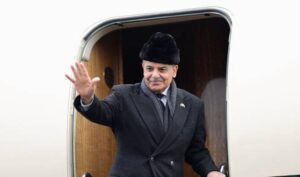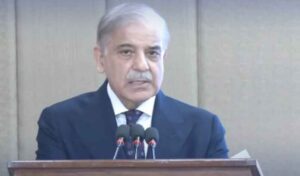In a significant development for international labor cooperation, Prime Minister Shehbaz Sharif announced that Belarus has agreed to accept 150,000 skilled Pakistani workers. This announcement marks a pivotal step in strengthening bilateral relations between Pakistan and Belarus while opening new employment avenues for Pakistani youth. The decision is expected to boost Pakistan’s remittance inflows and ease unemployment pressures at home.
PM Shehbaz emphasized that this opportunity aligns with his government’s vision of empowering the country’s workforce and enhancing its global outreach. The demand for skilled labor in Belarus spans sectors such as construction, healthcare, IT, and manufacturing, making it a promising destination for trained professionals from Pakistan. The government is also planning to facilitate the workers’ smooth integration into Belarusian society through proper training, documentation, and support.
Introduction: A Landmark Announcement by PM Shehbaz
In a significant development aimed at strengthening bilateral relations and addressing labor market demands, Prime Minister Shehbaz Sharif announced that Belarus has agreed to accept 150,000 skilled workers from Pakistan. This announcement comes as part of growing cooperation between the two countries, especially in the areas of labor, trade, and experienced workforce mobility.
Context of the Agreement

The agreement between Pakistan and Belarus emerged during high-level talks between government officials. The Belarusian government expressed its need for a skilled workforce in various sectors such as agriculture, construction, healthcare, and engineering. PM Shehbaz responded by offering Pakistan’s talent pool of qualified workers to help meet those requirements.
Understanding the Need: Belarus’s Labor Shortages
Belarus, like many Eastern European countries, has been facing labor shortages in several critical sectors. This has been attributed mainly to aging populations, lower birth rates, and the migration of workers to Western Europe for better opportunities. As a result, the country has turned to countries like Pakistan for a skilled workforce to meet its growing demands.
Key sectors that have seen a shortage of skilled labor include:
- Construction: With growing infrastructure projects, the need for skilled labor like engineers, construction workers, and project managers is in high demand.
- Healthcare: Belarus requires medical professionals such as doctors, nurses, and medical technicians.
- Manufacturing: Engineers, electricians, and other technical workers are needed in Belarus’s expanding manufacturing industry.
- Information Technology: There is a shortage of IT professionals who can support digital transformation efforts.
- Agriculture: The agricultural sector needs skilled workers to manage the latest farming techniques and technology.
Pakistan’s Workforce Potential and Skilled Labor Capacity
Pakistan is home to a vast pool of skilled workers across a variety of fields. The country has been investing in technical education and vocational training through programs and institutions like NAVTTC (National Vocational and Technical Training Commission), TEVTA (Technical Education and Vocational Training Authority), and IT training centers. Pakistan has a long history of sending its workforce abroad to countries in the Middle East, Asia, and Europe.
Pakistan’s skilled labor force is:
- Cost-effective: Pakistani workers are highly competitive in terms of wage expectations while maintaining a high standard of skill.
- Trained in diverse sectors: Workers in Pakistan are trained in healthcare, engineering, construction, and IT, making them versatile for many job sectors in foreign countries.
- Hardworking and disciplined: Pakistanis are known for their strong work ethic, adaptability, and ability to integrate into different work cultures.
Sectors in Belarus That Will Benefit from Skilled Pakistani Workers
The sectors in Belarus that will directly benefit from this agreement with Pakistan are diverse. Skilled Pakistani workers will be deployed across various domains where there is substantial demand for foreign labor:

- Construction and Infrastructure: Belarus has large-scale infrastructure projects, including road development, residential buildings, and public infrastructure, requiring skilled engineers, project managers, electricians, and general laborers.
- Agriculture and Horticulture: With a growing demand for agricultural productivity, Pakistani farmers and agricultural experts will help increase crop yields, dairy farming, and modernize farming techniques.
- Healthcare: There is a significant need for medical professionals, and Pakistan’s doctors, nurses, and lab technicians will be able to contribute to improving the Belarusian healthcare system.
- Information Technology (IT): Pakistan’s IT professionals, especially software developers, data analysts, and network engineers, will find ample opportunities in Belarus’s rapidly growing tech sector.
- Manufacturing and Engineering: Skilled mechanical, electrical, and civil engineers from Pakistan will support Belarus’s manufacturing and industrial growth.
- Textile and Apparel: Pakistan’s established expertise in textiles can be valuable in strengthening Belarus’s textile industry.
Economic Benefits for Pakistan’s Skilled Workforce
The agreement between Belarus and Pakistan promises substantial economic benefits for Pakistan, especially in terms of:
- Increased remittances: As workers send money back home, remittances will provide a vital boost to Pakistan’s foreign exchange reserves, supporting the national economy.
- Improved livelihoods: Pakistani workers will benefit from better salaries compared to local standards, allowing them to uplift their families’ living standards.
- Employment opportunities: This agreement will directly help 150,000 workers find formal and long-term employment in a foreign country.
- Professional growth and international exposure: Pakistani workers will gain valuable experience, which will further enhance their skills and employability, both abroad and in the domestic market.
Key Steps in the Recruitment Process
To implement this agreement, the governments of both countries must establish an organized process for recruitment, training, and deployment. Some of the steps that will be involved include:
- Eligibility criteria: The Pakistani government will define the required skills and qualifications for workers across various sectors.
- Skills training and certifications: To meet Belarus’s work standards, workers will need to undergo additional language training (likely in Russian or English) and sector-specific training.
- Visa processing and documentation: The Ministry of Overseas Pakistanis and various Pakistani embassies will assist in fast-tracking visa and work permit applications.
- Orientation and support: Pakistani workers will undergo an orientation program to familiarize them with Belarusian culture, work environment, and legal rights.
- Monitoring and regulation: Both countries will regularly check to ensure workers are placed in suitable jobs, treated fairly, and provided with proper working conditions.
The Role of Government Agencies in Pakistan

Several government agencies will be involved in overseeing the deployment of workers to Belarus:
- Ministry of Overseas Pakistanis: Will handle the recruitment process, manage labor agreements, and provide support to workers.
- NAVTTC and TEVTA: These agencies will train workers in skills that are in demand in Belarus.
- Pakistani Embassies: The embassies in Belarus will help with visa processing, worker orientation, and support services.
- Bureau of Emigration and Overseas Employment: This body monitors the welfare of workers and ensures safe and lawful recruitment practices.
Implications for Pakistan-Belarus Relations
This labor agreement will undoubtedly strengthen Pakistan’s bilateral relations with Belarus. It creates opportunities for:
- Cultural exchange: Pakistani workers will bring their culture to Belarus and vice versa, enhancing the people-to-people connections.
- Economic cooperation: As labor ties deepen, other forms of trade and investment between the two countries could follow.
- Future labor mobility: This deal could serve as a model for other countries looking to engage Pakistan in the labor market.
Frequently Asked Questions
How many Pakistani workers will Belarus accept?
Belarus will accept 150,000 skilled Pakistani workers.
Who announced this development?
Prime Minister Shehbaz Sharif announced the agreement.
Which sectors in Belarus need skilled workers?
Sectors include construction, healthcare, IT, and manufacturing.
What benefits will Pakistan gain from this agreement?
It will reduce unemployment and increase remittances.
Will the government provide training to selected workers?
Yes, the government plans to provide skill-based training and documentation support.
Is this agreement part of a more considerable diplomatic effort?
Yes, it reflects stronger bilateral ties between Pakistan and Belarus.
Are unskilled workers included in the agreement?
No, the focus is specifically on skilled labor.
When will the migration process begin?
Timelines are yet to be finalized, but preparations are underway.
Will workers receive any assistance in Belarus?
Yes, support systems are being discussed for smoother integration.
How does this impact Pakistan’s global workforce presence?
It enhances Pakistan’s reputation as a source of skilled human capital.
Conclusion
The announcement that Belarus will welcome 150,000 skilled Pakistani workers represents a significant milestone in Pakistan’s foreign labor strategy. This opportunity not only addresses domestic employment challenges but also strengthens diplomatic and economic ties between the two countries. With proper training, documentation, and integration support, the initiative can lead to long-term success stories for thousands of Pakistani families. It highlights the global demand for Pakistani talent and sets a precedent for future international collaborations. As the program unfolds, it is expected to generate sustainable income, boost remittances, and reinforce Pakistan’s position in the global labor market.

